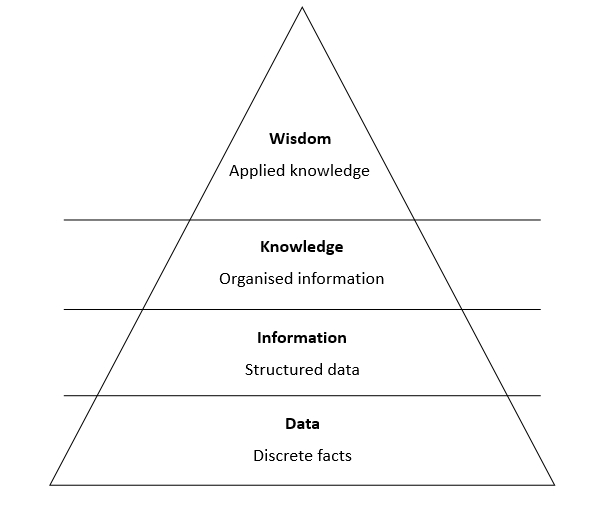Knowledge

|
Very broadly, the term ‘knowledge’ refers to organised information, such as might be found in a report.
It is differentiated from data - which refers to discrete facts (numbers and characters that in themselves have no meaning) and information - which is data that has been structured so that it does have meaning (such as text or a table).
The application of knowledge is sometimes referred to as wisdom.
Knowledge can be explicit knowledge, which has been codified and recorded, or tacit knowledge, which is experiential and more difficult to formalise.
The construction industry is a knowledge-based industry, which depends on knowledge and high skill levels, and has an increasing need for ready access to knowledge. Knowledge is vital to the construction industry, defining what is required, setting standards and explaining what is possible. It includes legislation, regulations, policy, best practice, research, innovations, news and so on. For more information see: Types of construction knowledge.
However, unlike data and information, which tend to be project based and so have clear authorship, ownership, responsibility and control, knowledge tends to be industry-wide and intra project, with no overall controlling mind. As a result, tt is fragmented, inconsistent, sometimes contradictory, and often hidden behind pay walls and membership sign ups, or held on private intranets.

|
The Construction Knowledge Task Group is working to improve the standardisation of, and access to knowledge by practitioners.
Articles about knowledge on Designing Buildings include:
- Concept-knowledge theory.
- Construction knowledge sources.
- Construction knowledge survey.
- Construction knowledge.
- Data.
- Indigenous knowledge.
- Knowledge based economy.
- Knowledge classification.
- Knowledge gap.
- Knowledge Hubs.
- Knowledge management in construction.
- Knowledge pyramid.
- Knowledge standard.
- Knowledge task group.
- Local knowledge.
- Specification for Discoverable Construction Knowledge.
- Traditional knowledge.
- Types of construction knowledge.
Featured articles and news
Call for greater recognition of professional standards
Chartered bodies representing more than 1.5 million individuals have written to the UK Government.
Cutting carbon, cost and risk in estate management
Lessons from Cardiff Met’s “Halve the Half” initiative.
Inspiring the next generation to fulfil an electrified future
Technical Manager at ECA on the importance of engagement between industry and education.
Repairing historic stone and slate roofs
The need for a code of practice and technical advice note.
Environmental compliance; a checklist for 2026
Legislative changes, policy shifts, phased rollouts, and compliance updates to be aware of.
UKCW London to tackle sector’s most pressing issues
AI and skills development, ecology and the environment, policy and planning and more.
Managing building safety risks
Across an existing residential portfolio; a client's perspective.
ECA support for Gate Safe’s Safe School Gates Campaign.
Core construction skills explained
Preparing for a career in construction.
Retrofitting for resilience with the Leicester Resilience Hub
Community-serving facilities, enhanced as support and essential services for climate-related disruptions.
Some of the articles relating to water, here to browse. Any missing?
Recognisable Gothic characters, designed to dramatically spout water away from buildings.
A case study and a warning to would-be developers
Creating four dwellings... after half a century of doing this job, why, oh why, is it so difficult?
Reform of the fire engineering profession
Fire Engineers Advisory Panel: Authoritative Statement, reactions and next steps.
Restoration and renewal of the Palace of Westminster
A complex project of cultural significance from full decant to EMI, opportunities and a potential a way forward.
Apprenticeships and the responsibility we share
Perspectives from the CIOB President as National Apprentice Week comes to a close.





















